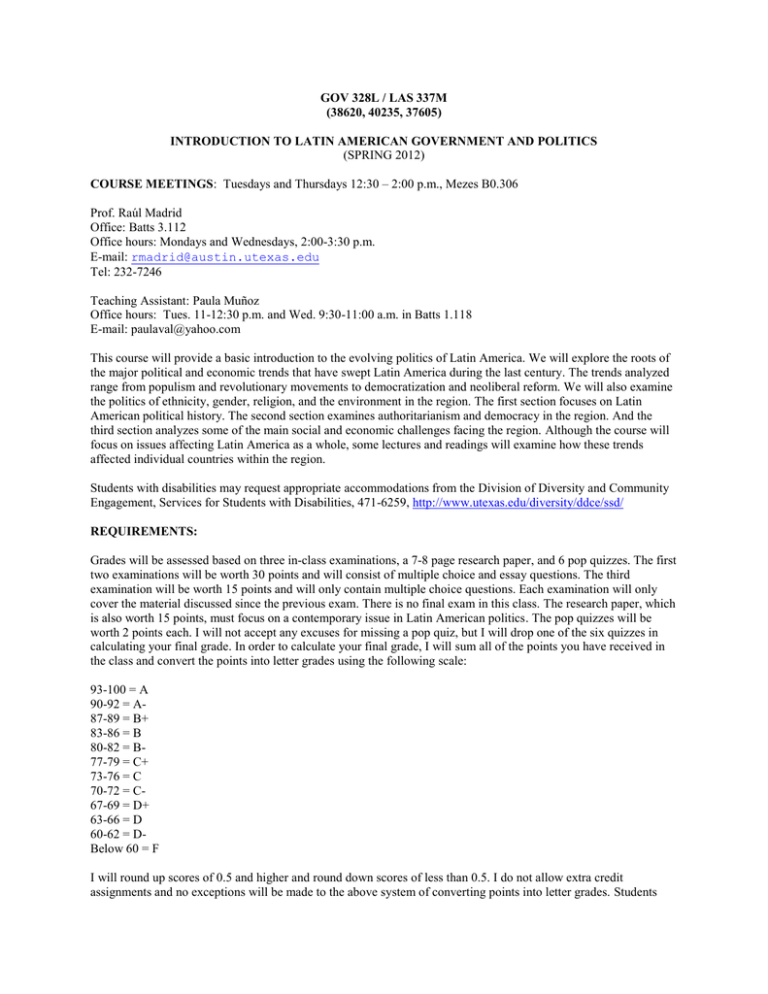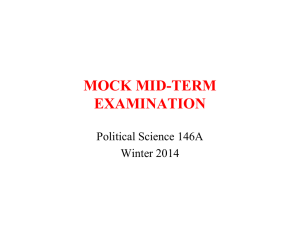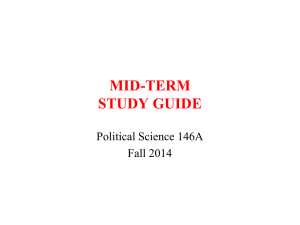Introduction to Latin America: People, geography
advertisement

GOV 328L / LAS 337M (38620, 40235, 37605) INTRODUCTION TO LATIN AMERICAN GOVERNMENT AND POLITICS (SPRING 2012) COURSE MEETINGS: Tuesdays and Thursdays 12:30 – 2:00 p.m., Mezes B0.306 Prof. Raúl Madrid Office: Batts 3.112 Office hours: Mondays and Wednesdays, 2:00-3:30 p.m. E-mail: rmadrid@austin.utexas.edu Tel: 232-7246 Teaching Assistant: Paula Muñoz Office hours: Tues. 11-12:30 p.m. and Wed. 9:30-11:00 a.m. in Batts 1.118 E-mail: paulaval@yahoo.com This course will provide a basic introduction to the evolving politics of Latin America. We will explore the roots of the major political and economic trends that have swept Latin America during the last century. The trends analyzed range from populism and revolutionary movements to democratization and neoliberal reform. We will also examine the politics of ethnicity, gender, religion, and the environment in the region. The first section focuses on Latin American political history. The second section examines authoritarianism and democracy in the region. And the third section analyzes some of the main social and economic challenges facing the region. Although the course will focus on issues affecting Latin America as a whole, some lectures and readings will examine how these trends affected individual countries within the region. Students with disabilities may request appropriate accommodations from the Division of Diversity and Community Engagement, Services for Students with Disabilities, 471-6259, http://www.utexas.edu/diversity/ddce/ssd/ REQUIREMENTS: Grades will be assessed based on three in-class examinations, a 7-8 page research paper, and 6 pop quizzes. The first two examinations will be worth 30 points and will consist of multiple choice and essay questions. The third examination will be worth 15 points and will only contain multiple choice questions. Each examination will only cover the material discussed since the previous exam. There is no final exam in this class. The research paper, which is also worth 15 points, must focus on a contemporary issue in Latin American politics. The pop quizzes will be worth 2 points each. I will not accept any excuses for missing a pop quiz, but I will drop one of the six quizzes in calculating your final grade. In order to calculate your final grade, I will sum all of the points you have received in the class and convert the points into letter grades using the following scale: 93-100 = A 90-92 = A87-89 = B+ 83-86 = B 80-82 = B77-79 = C+ 73-76 = C 70-72 = C67-69 = D+ 63-66 = D 60-62 = DBelow 60 = F I will round up scores of 0.5 and higher and round down scores of less than 0.5. I do not allow extra credit assignments and no exceptions will be made to the above system of converting points into letter grades. Students who wish to contest a grade must do so in writing within two weeks of the day on which the exams or papers were handed back in class. Policy on Scholastic Dishonesty: Students who violate University rules on scholastic dishonesty are subject to disciplinary penalties, including the possibility of failure in the course and/or dismissal from the University. Since such dishonesty harms the individual, all students, and the integrity of the University, policies on scholastic dishonesty will be strictly enforced. For further information on academic integrity and plagiarism please visit the Student Judicial Services Web site: http://deanofstudents.utexas.edu/sjs/acint_student.php I allow students with a reasonable excuse (e.g., an illness) to make up one exam per semester (but no quizzes) without penalty. The makeup exam will take place within five days of the regularly scheduled exam at a time and date of my choosing. Students who need to miss a class due to a religious holiday should notify me at least fourteen days prior to the holiday. If you must miss a class, an examination, a work assignment, or a project in order to observe a religious holy day, you will be given an opportunity to complete the missed work within a reasonable time after the absence. REQUIRED TEXTS: Hillman, Richard S., ed. Understanding Contemporary Latin America. Boulder: Lynne Rienner Publishers, 2011, 4th edition. Smith, Peter H. Democracy in Latin America. New York: Oxford University Press, 2011, 2nd edition. Winn, Peter. Americas: The Changing Face of Latin America and the Caribbean. Berkeley: Univ. of California Press, 2006, 3rd Edition. A course packet of additional readings will be available on Blackboard or may be purchased at Paradigm (407 W. 24th St., tel: 472-7986). WEEKLY READINGS Week 1 (Jan. 17 and 19) Introduction to Latin America: People, geography and politics Hillman, Ch. 1 "Introduction" Hillman, Ch. 2 "Latin America: A Geographical Preface". Hillman, Ch. 4 "Latin American Politics". Winn, Chapter 1 "A View from the South". I. LATIN AMERICAN POLITICAL HISTORY Week 2 (Jan. 24 and 26) Pre-20th Century Latin America Hillman, Ch. 3 "The Historical Context". Winn, Chapter 2 "Legacies of Empire". Coatsworth, John. 1998. "Economic and Institutional Trajectories in Nineteenth-Century Latin America." In Coatsworth and Alan M. Taylor eds. Latin America and the World Economy since 1800. Harvard University Press, pp. 23-54 (Course packet). Week 3 (Jan. 31 and Feb. 2) Populism and Industrialization Hillman, Ch. 6 "The Economies of Latin America". Winn, Chapter 4, "A Second Independence". Robert R. Kaufman and Barbara Stallings. "The Political Economy of Latin American Populism." in Rudiger Dornbusch and Sebastian Edwards, Macroeconomics of Populism. MIT Press, pp. 15-33 (Course packet). Weeks 4-5 (Feb. 7, 9, and 14) Revolutionary Movements Winn, Chapter 13, "Making Revolution". Crahan, Margaret E. and Peter H. Smith. "The State of Revolution." In Alfred Stepan, ed. Americas: New Interpretative Essays. Oxford University Press, 1992, pp. 79-108. (Course packet). Wickham-Crowley, Timothy. "Winners, Losers and Also-Rans: Toward a Comparative Sociology of Latin American Guerilla Movements." In Susan Eckstein, ed. Power and Popular Protest. Berkeley, CA: UC Press, 1989, pp. 132-181. (Course packet). Feb. 16. 1st examination II. AUTHORITARIANISM AND DEMOCRACY IN LATIN AMERICA Week 6-7 (Feb. 21, 23, and 28) Military regimes Hillman, Chapter 5 "The Military." Collier, David. "Overview of the Bureaucratic-Authoritarian Model." In Collier, ed. The New Authoritarianism in Latin America. Princeton University Press, 1979, pp. 19-32. (Course packet). Valenzuela, Arturo. "Chile: Origins, Consolidation, and Breakdown of a Democratic Regime." In Larry Diamond, Juan J. Linz, and Seymour Martin Lipset, eds. Politics in Developing Countries: Comparing Experiences with Democracy. Boulder, CO: Lynne Rienner, 1990, pp. 39-87. (Course packet). Stepan, Alfred. "Political Leadership and Regime Breakdown: Brazil." In Linz and Stepan eds., The Breakdown of Democratic Regimes: Latin America. Baltimore: Johns Hopkins University Press, 1978, pp. 110-137. (Course packet) Winn, Chapter 5 "Capital Sins". Weeks 7-8 (March 1, 6, and 8) Democracy and Democratization in Latin America Smith, Introduction and Chs. 1-4, pp. 1-131. Week 9: Spring Break Week 10 (March 20 and 22) Democratic Institutions Smith, Chs. 5-7, pp. 135-208. John M. Carey, “Presidentialism and Representative Institutions.” In Jorge Domínguez and Michael Shifter, eds. Constructing Democratic Governance in Latin America. Baltimore: Johns Hopkins University Press, 2003: 11-42. (Course packet) Week 11 (March 27 and 29) Consolidation of Democracy Smith, Ch. 8-12 and epilogue, pp. 211-344. April 3. 2nd examination III. CONTEMPORARY ISSUES IN LATIN AMERICAN POLITICS Week 12 (April 5). Urbanization and the Environment Hillman, Ch. 8, "The Environment, Population and Urbanization". Winn, Ch. 6 "Continent on the Move". Economic Commission for Latin America and the Caribbean. A Decade of Light and Shadow: Latin America and the Caribbean in the 1990s. Santiago, Chile: Economic Commission for Latin America, 2003. Ch. 7, pp. 261-292 (Course packet). Week 13 (April 10 and 12). Race and ethnicity in Latin America. Hillman, Ch. 9 "Patterns of Race, Ethnicity, Class and Nationalism.". Winn, Ch. 7, "Children of the Sun." Winn, Ch. 8, "A Question of Color". Week 14 (April 17 and 19). Crisis and economic reform Edwards, Sebastian. Crisis and Reform in Latin America: From Despair to Hope. New York: Oxford University Press, 1995, Chs. 1-3, pp. 1-65. (Course packet) Hojman, David. “The Political Economy of Recent Conversions to Market Economics in Latin America.” Journal of Latin American Studies 26, 1994, pp. 191-219. (Course packet) Week 15 (April 24 and 26). Gender in Latin America Hillman, Ch. 10 "Women, Work, and Politics". Winn, Ch. 9, "In Women's Hands". Htun, Mala. “Women and Democracy.” In Jorge Domínguez and Michael Shifter, eds. Constructing Democratic Governance in Latin America. Baltimore: Johns Hopkins University Press, 2003: 118-136. (Course packet) April 26. Research paper due in class. Week 16 (May 1). The Church in Latin America Hillman, Ch. 12 "Religion in Latin America." Winn, Ch. 10, "The Power and the Glory." May 3. 3rd Examination






